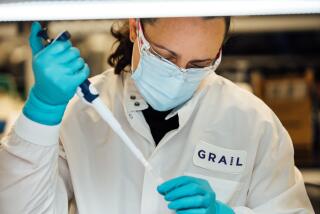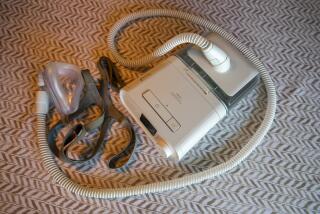HEAD FDA Questions Product Promotion by Irvine’s Biopsys
- Share via
IRVINE — The U.S. Food and Drug Administration has raised serious questions about Biopsys Medical Inc.’s promotion of its key product for detecting and treating breast cancer.
The agency warned the tiny Irvine biomedical company last week that Biopsys hasn’t received approval to market its “Mammotome” needle and related items for sampling breast tissue for diagnosis.
Regulators also faulted the company for separately promoting the device as an instrument to remove breast cancer--an area of concern previously raised by an agency panel last fall.
In a letter, the agency warned the company that unless it takes steps to correct the violations by next week, it might take further action, including seizure of products, an injunction and fines.
Steven Gex, the company’s president, said Biopsys is cooperating fully with the agency and expects to submit an application for approval of the device for detection of breast cancer. He said the company had been conferring with one FDA division about the application and was “surprised” to receive the warning letter from the separate compliance division.
The FDA told the company that it approved the device two years ago for use in detecting cancer in the gastric tract and urological system, but not the breast. “Your company’s use of the name ‘Mammotome’ or ‘Mammotome Breast Biopsy System’ implies specific use as a breast biopsy device,” the letter said.
Gex said, however, that the company had received general clearance to market the device for detection of cancer in soft tissue, including the breast.
The product has been installed in doctor’s offices, hospitals and breast imaging centers, the company reported in documents filed last year before its initial public stock offering.
The FDA also objected to a public statement last December by Dr. Steven Parker, a company founder and shareholder, describing in glowing terms how patients reacted to the device’s effectiveness on cancerous lesions.
“When they see the lesion literally disappear before their eyes, their confidence in the procedure skyrockets,” said Parker, a Denver radiologist.
Dr. Edward Sickles, a professor at UC San Francisco and former FDA advisor, said that when such a device is used to remove breast cancer, it’s impossible to tell whether the entire lesion has been taken out.
Further research and testing is required before the company can make that claim, he said.
The company’s stock dropped Tuesday by $1.25 a share to $27 in Nasdaq trading.
More to Read
Inside the business of entertainment
The Wide Shot brings you news, analysis and insights on everything from streaming wars to production — and what it all means for the future.
You may occasionally receive promotional content from the Los Angeles Times.










